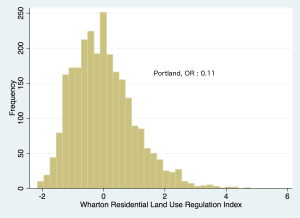I am in Portland for the Urban Economics Association meeting, an exciting meeting of like-minded economists studying the dynamics of cities, the relationship between the demand/supply of housing and prices, and many other topics.
Being here is also a great opportunity to learn a bit about what everybody’s talking about when it comes to Portland’s urban dynamics: Portland has stringent land use regulations that push prices up and hinder the metropolitan area’s growth. This is what the economist says about this.
Some evidence supports the hypothesis that land use regulations push prices up. In particular, house prices (unlike GDP) are back on an upward trend that means that today’s prices are back to their 2006 level, at the peak of the housing boom.
Are Portland’s land use regulations that stringent? A quick look at the best available data, from Joseph Gyourko’s land use regulation survey data, reveals the following:
- Portland’s regulation index i
 s around the median (0.11), which suggests that the claim that Portland is one of the most regulated cities in the US isn’t supported by the data. The regulation index summarizes cities’ answer to about 11-12 questions.
s around the median (0.11), which suggests that the claim that Portland is one of the most regulated cities in the US isn’t supported by the data. The regulation index summarizes cities’ answer to about 11-12 questions. - It doesn’t seem that the length of the zoning process, the length of the permit process, school crowding, council or citizen opposition are major factors that constrain the supply of housing units.
- The single most important factor that stands out from Joseph Gyourko’s survey is simply that the demand for single family housing far outstrips the supply of zoned land for such single family housing.
